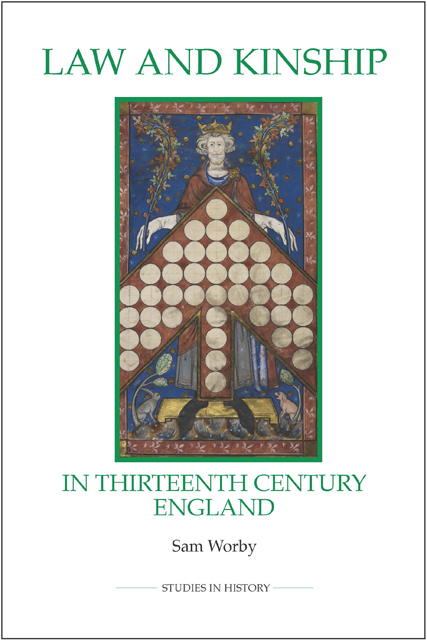Book contents
- Frontmatter
- Contents
- List of illustrations
- List of tables
- Acknowledgements
- Abbreviations
- Introduction
- 1 Canon law kinship structures
- 2 Common law kinship structures
- 3 The dominance of canon law kinship ideas
- 4 Kinship laws in practice
- 5 Trends underlying legal kinship structures
- Conclusion
- Appendices
- Bibliography
- Index
- Frontmatter
- Contents
- List of illustrations
- List of tables
- Acknowledgements
- Abbreviations
- Introduction
- 1 Canon law kinship structures
- 2 Common law kinship structures
- 3 The dominance of canon law kinship ideas
- 4 Kinship laws in practice
- 5 Trends underlying legal kinship structures
- Conclusion
- Appendices
- Bibliography
- Index
Summary
The kinship system of the canon law was the foremost general model for thinking about kinship structures in late medieval England. Even common lawyers, specialists in their own system of kinship, turned to the canon law where they perceived that there was a gap their own literature, or no inherent answer in their rules. On a wider level, the structures of canon law kinship were also understood, by theologians such as Kilwardby, as part of the way in which the social world was ordered. In practice, there was no clan or quasi-corporate kinship system. There were locally recognised variations and patterns of kinship, but only hints of structured kinship survived outside the law (more indicative of patterns of practice than a system).
Both canon and common law applied in their specific contexts. The dominance of the canon law can be seen through the canon law kinship treatises, pictures and ideas that appeared in common law contexts, in particular ideas about the limit of kinship (at four degrees or generations) and about the underlying structures (rather than marriage rules themselves). Such borrowed ideas were not always very sophisticated, and they had very specific impacts on common law practice, such as providing a limit on kinship where one was not inherent. The canon law kinship system, particularly in relation to blood kinship, was dominant because it had a simple negative rule, was easily summarised and, in literate contexts, clearly expressed and because the system was applied to anyone wanting to marry legitimately and supported by public enforcement mechanisms such as the banns. The system was live and widespread, unlike that of the civil law which was, in England at that time, a relic studied in universities. The author of Bractonhad attempted to summarise common law kinship borrowing civil law concepts, but this had not been successful. Later common lawyers instead incorporated canon law kinship treatises into their texts.
The system of the canon law was also intellectual and taxonomic, studied and discussed by expert lawyers in the universities. Beyond the law faculties, the theologian Kilwardby used canon law kinship as part of a scheme for ordering the social world. Kinship was, after all, one of the more important social bonds.
- Type
- Chapter
- Information
- Law and Kinship in Thirteenth-Century England , pp. 141 - 146Publisher: Boydell & BrewerPrint publication year: 2010



